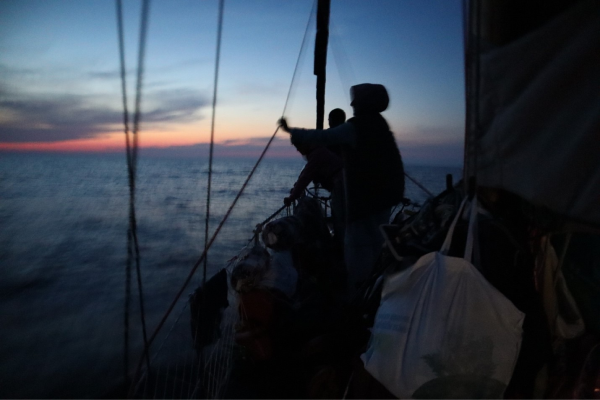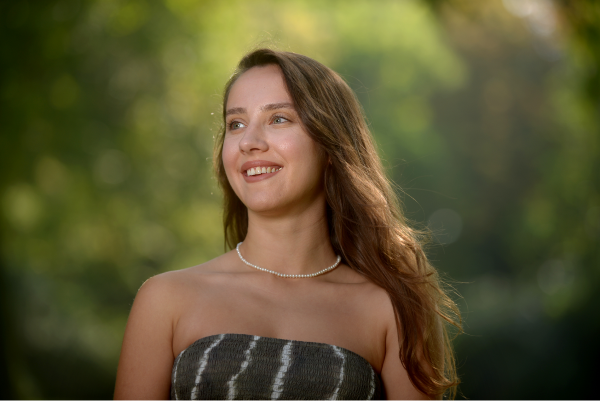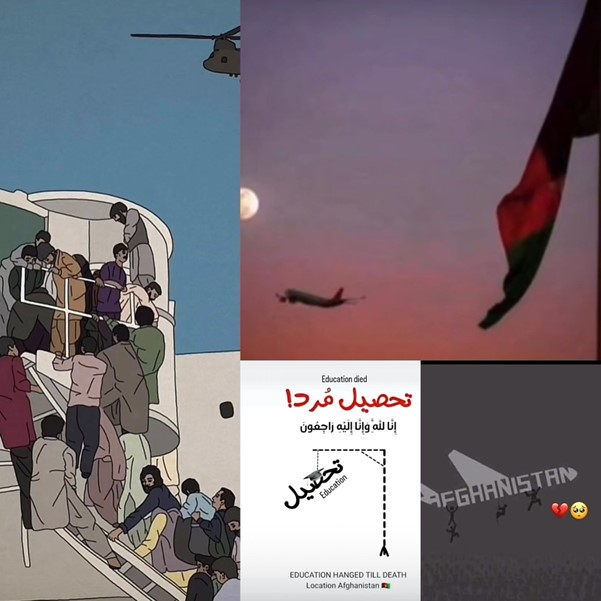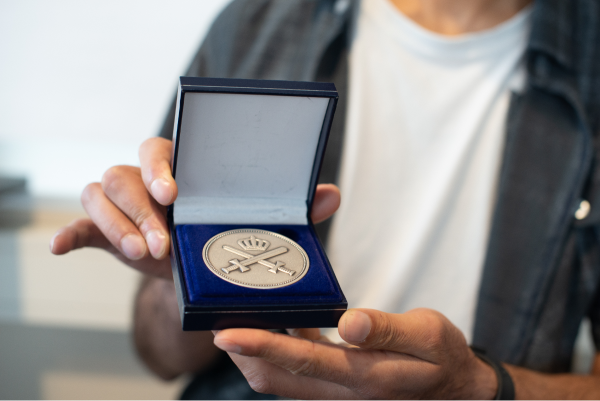Students of the study program NT2 (Dutch as a Second Language) wrote short personal stories, using a photo or object. Stories about their home country or flight to the Netherlands. WIN selected four of them.
Dance performance

On the day we were greeted by the Mediterranean dolphins on the edge of the Spanish coast, I felt that life was worth living despite everything. It was about three years ago, and our wooden sailboat bobbed gently on the waves. I was already used to the salty air of the Mediterranean Sea and the painting of a setting sun with an orange and purple palette in the sky.
We were exhausted from the long and hard journey from Turkey. An engine failure limited our speed to two kilometres per hour. The boom (a sturdy horizontal mast to keep the mainsail steady) that was destroyed by the strong wind gave a good impression of our state. We were right in the middle of uncertainty. The dream of England seemed further away than ever. But then something wonderful happened. A school of fish glistened at the bow of our boat. With renewed energy, we ran to the railing. Then we saw dozens of dolphins right by the boat. They were everywhere. One of the things I will never forget is the beautiful sound that came from the water when the dolphins jumped. It was more than a dance performance; we felt that they had come to greet us, to raise our hopes.
This experience was truly a bright moment. I feel like I approach all of nature, all beings and all people with more compassion now. This memory plays a big part in this. In the photo you see silhouettes of my boyfriend and his sister. Even though the sun was setting, the joy on their faces is clear.
Anonymous writer
Buket: ‘Pearls of his heart’

One of my grandfathers was very important to me. That’s why I want to share this story about him. He passed away fifteen years ago; I still miss him very much. He loved his grandchildren and I played with him outside a lot. He taught me how to ride a bike. Since I was ten years old, we lived in Istanbul. During parties and summer holidays, we went to the village where my grandmother and grandfather lived.
Photo: Jasper van Overbeek
When I went to the village, my grandfather always made a swing for me and we ate ice cream together. Every morning we brought my uncle’s milk bottles to the dairy cooperative. My grandmother made cheese herself and I really liked it. That’s why sometimes my grandfather came to Istanbul especially for me to bring cheese. I don’t remember many things from my childhood, but these events seem like they happened yesterday. I felt loved, happy and very calm.
My grandfather gave me many gifts during his life, but the most special one was without a doubt this pearl necklace. When I was eight years old, he went on a pilgrimage to Mecca. I was sad about his departure and I cried a lot. After the pilgrimage, he brought this pearl necklace as a gift for me.
What makes this necklace really special to me is that I wore it at my wedding. I wish my husband could have met my grandfather and my grandfather could have been at our wedding. But at least I had my pearl necklace, and it made me feel like he was there with me. Thank goodness you were my grandfather, my dear grandfather.
Rabeha: ‘The most somber sunset’

The day I went to university was a typical Saturday. It had been a holiday and we had just started classes again. But that day was not like any other day. There was confusion everywhere on the streets and people were afraid that something bad would happen.
In the late morning, I rushed to leave the university and go home. As I walked out, I looked at my university for the last time. I never imagined that this would be my last day in Kabul. It was exactly four o’clock in the afternoon when the Taliban announced their rule. The most painful moment for me was when they took down the Afghan flag and raised the Taliban flag.
The next day many people left their homes to flee. Everyone tried to get on a plane that was leaving the country. Three Afghan boys fell to their death trying to climb on a plane. This is a tragedy that is impossible to accept.
A month later, a powerful explosion occurred at Kabul airport, killing hundreds of people and martyring many. After these events, schools and universities were closed for girls and women. I fled to the Netherlands to have a comfortable life. This was my bitter story that I wanted to share with you.
Wali: ‘Taking risks’
Before I came to the Netherlands, I was in hiding in the capital of Uruzgan, Tarin Kowt. Every day I received threats via letters, phone calls and text messages from a sender who called himself the ‘Islamic Emirate’. “Surrender, or we will go after your entire family,” it said. I was a target of the Taliban because I had worked for various international aid organizations such as Save the Children, Cordaid, USAID and others. In addition, my father was a district head from Uruzgan who worked closely with the Dutch troops there.
During the fall of Afghanistan I was stuck in Afghanistan. I asked for help, but it took a long time and the situation in Afghanistan changed against expectations. After the fall of Afghanistan I went to Kabul in a terrible situation and then to Kabul airport. We tried several times to get on the Dutch evacuation flights, but because of the chaos it didn’t work. A new attempt in that dangerous and terrible situation was too much for my young daughters and my wife. All hope was gone then. Until later, via a complex escape route, my family and I were able to leave Afghanistan with help from the Netherlands and America.

When I came to the Netherlands, I started with the Dutch language. I had a teacher in the AZC, Jan de Vries. He helped me a lot to learn the basics of Dutch. We now live in a beautiful city, Steenwijk. I love ICT, that is why I am doing an internship at an ICT company and I want to do an ICT education. My wife also goes to a language school in Steenwijk and she is very happy, because she now has the chance to study. My children go to school and they have made friends and they are very happy. At the moment I am in the language bridging program at Windesheim. A few days ago I was honored for my work for Dutch soldiers during missions in Afghanistan. Although I have won more medals, this coin is the most valuable to me. I am very happy and proud. I look very positively to the future, because we are safe here and I can work with confidence and joy again. I have no contact with my father, because there is no internet there. But I have contact with other people, that is where the horror is spreading right now. When I think about those days, I have nightmares.
Magazine helps growing stronger
These four stories come from a magazine that the students made as part of their training.
“Our students are mostly people who have already lived a whole life. There is an enormous wealth of cultures and stories in them,” says Sjoerd Litjens, recently appointed NT2 teacher and initiator of the magazine. “Beautiful stories, but sometimes also very sad ones,” adds fellow teacher Inge Groenhuis.
“Not all students enjoy writing in a foreign language, even though it is of course a compulsory part. That is why we thought: how great would it be if they enjoyed writing about something that is close to their hearts? And then receive it as a beautifully printed magazine and show it to other people?”
Sjoerd: “Coming to terms is very important, in a sense also therapeutic. It is a means to be able to take steps. Our students end up here in a completely different reality and want to take steps to build a new life. Having clarity about where you come from and where you want to go, writing down your story can be very valuable.”
The NT2 study program at Windesheim serves people who want to learn the Dutch language. Many students have fled to Europe and come from countries such as Syria, Sudan, Turkey or Yemen. But migrants who moved to the Netherlands for work or love also register. The course has been around for over 22 years and focuses primarily on people who have already obtained a diploma in their country of origin and want to start a higher professional or university study here. NT2 currently has between one hundred and eighty and two hundred students. In recent years, between sixty and eighty different nationalities have passed by.
NT2 is continuously looking for language coaches who practice speaking skills one-on-one with a student as an ‘extra’ in addition to their education. Inge: “Would you like to do this for an hour a week, for example? Send me a message.”